unit2知识点
- 格式:doc
- 大小:89.50 KB
- 文档页数:7
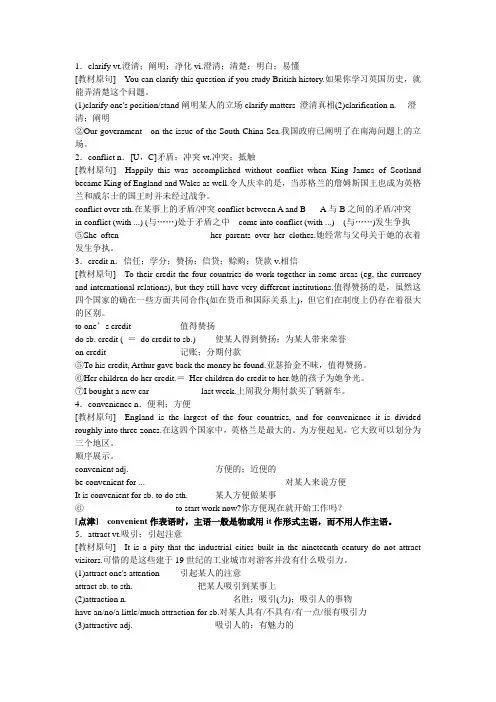
1.clarify vt.澄清;阐明;净化vi.澄清;清楚;明白;易懂[教材原句]You can clarify this question if you study British history.如果你学习英国历史,就能弄清楚这个问题。
(1)clarify one's position/stand阐明某人的立场clarify matters 澄清真相(2)clarification n. 澄清;阐明②Our government on the issue of the South China Sea.我国政府已阐明了在南海问题上的立场。
2.conflict n.[U,C]矛盾;冲突vt.冲突;抵触[教材原句]Happily this was accomplished without conflict when King James of Scotland became King of England and Wales as well.令人庆幸的是,当苏格兰的詹姆斯国王也成为英格兰和威尔士的国王时并未经过战争。
conflict over sth.在某事上的矛盾/冲突conflict between A and B A与B之间的矛盾/冲突in conflict (with ...) (与……)处于矛盾之中come into conflict (with ...) (与……)发生争执⑤She often her parents over her clothes.她经常与父母关于她的衣着发生争执。
3.credit n.信任;学分;赞扬;信贷;赊购;贷款v.相信[教材原句]To their credit the four countries do work together in some areas (eg, the currency and international relations), but they still have very different institutions.值得赞扬的是,虽然这四个国家的确在一些方面共同合作(如在货币和国际关系上),但它们在制度上仍存在着很大的区别。
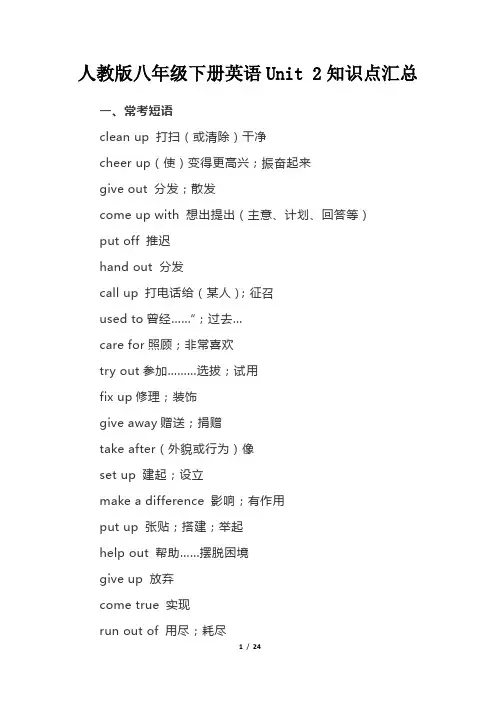
人教版八年级下册英语Unit 2知识点汇总一、常考短语clean up 打扫(或清除)干净cheer up(使)变得更高兴;振奋起来give out 分发;散发come up with 想出提出(主意、计划、回答等)put off 推迟hand out 分发call up 打电话给(某人);征召used to曾经……“;过去…care for照顾;非常喜欢try out参加………选拔;试用fix up修理;装饰give away赠送;捐赠take after(外貌或行为)像set up 建起;设立make a difference 影响;有作用put up 张贴;搭建;举起help out 帮助……摆脱困境give up 放弃come true 实现run out of 用尽;耗尽be similar to 与………相似volunteer to do sth 自愿做某事make plans to do sth 制订计划做某事ask sb (not) to do sth 要求某人(不要)做某事used to do sth 过去常常做某事give up+时间+to do sth腾出时间做某事get a feeling of 产生…的感觉decide to do sth 决定做某事help sb (to) do sth帮助某人做某事make a difference to对…产生影响make it possible for sb to do sth使得做某事对某人来说成为可能三、经典句型1.You could help to clean up the city parks. A(9)你可以帮助打扫城市公园。
(1)could意为“能;可以”,其后接动词原形,可以用于提出建议,语气比can委婉。
You could walk to the park.你可以步行去公园。
拓展:could表示过去的能力时,是can的过去式。
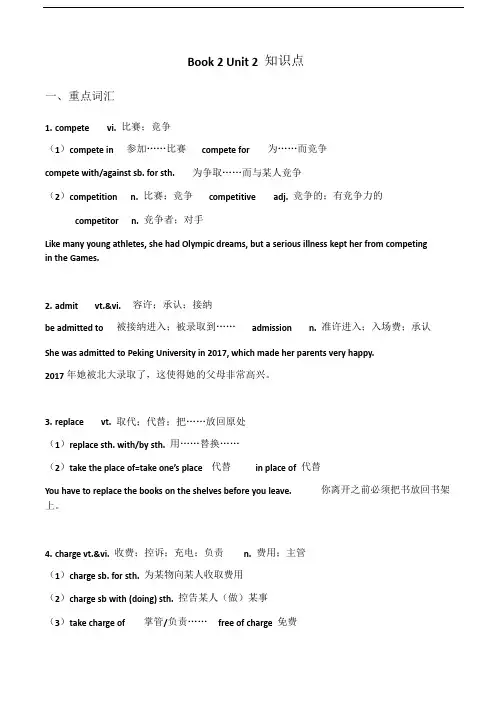
Book2Unit2知识点一、重点词汇pete vi.比赛;竞争(1)compete in参加……比赛compete for为……而竞争compete with/against sb.for sth.为争取……而与某人竞争(2)competition n.比赛;竞争competitive adj.竞争的;有竞争力的competitor n.竞争者;对手Like many young athletes,she had Olympic dreams,but a serious illness kept her from competingin the Games.2.admit vt.&vi.容许;承认;接纳be admitted to被接纳进入;被录取到……admission n.准许进入;入场费;承认She was admitted to Peking University in2017,which made her parents very happy.2017年她被北大录取了,这使得她的父母非常高兴。
3.replace vt.取代;代替;把……放回原处(1)replace sth.with/by sth.用……替换……(2)take the place of=take one’s place代替in place of代替You have to replace the books on the shelves before you leave.你离开之前必须把书放回书架上。
4.charge vt.&vi.收费;控诉;充电;负责n.费用;主管(1)charge sb.for sth.为某物向某人收取费用(2)charge sb with(doing)sth.控告某人(做)某事(3)take charge of掌管/负责……free of charge免费in charge of管理……in the charge of受……的管理There is a heated discussion on whether museums should charge for admission or not.人们就博物馆是否应该收入场费有激烈的争论。
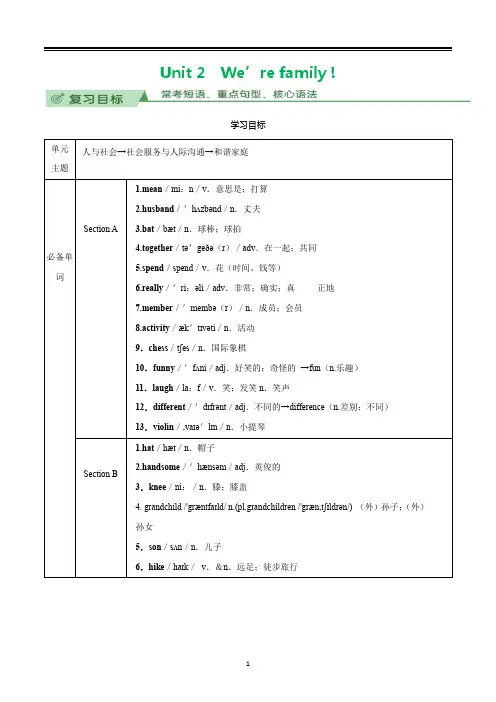
Unit 2 We’re family !学习目标单元主题人与社会→社会服务与人际沟通→和谐家庭必备单词Section A1.mean/mi:n/v.意思是;打算2.husband/'hʌzbənd/n.丈夫3.bat/bæt/n.球棒;球拍4.together/tə'geðə(r)/adv.在一起;共同5.spend/spend/v.花(时间、钱等)6.really/'ri:əli/adv.非常;确实;真正地7.member/'membə(r)/n.成员;会员8.activity/æk'tɪvəti/n.活动9.chess/tʃes/n.国际象棋10.funny/'fʌni/adj.好笑的;奇怪的→fun(n.乐趣)11.laugh/la:f/v.笑;发笑n.笑声12.different/'dɪfrənt/adj.不同的→difference(n.差别;不同)13.violin/,vaɪə'lɪn/n.小提琴Section B1.hat/hæt/n.帽子2.handsome/'hænsəm/adj.英俊的3.knee/ni:/n.膝;膝盖4. grandchild /'græntfaɪld/ n.(pl.grandchildren /'græn,tʃɪldrən/) (外)孙子;(外)孙女5.son/sʌn/n.儿子6.hike/haɪk/v.&n.远足;徒步旅行高频短语e in 进来2.ping-pong bat乒乓球拍3.play ping-pong打乒乓球4.every day每天5.fishing rod钓竿6.a lot of/lots of大量;许多7.Chinese chess中国象棋8.play the erhu 拉二胡9.big and clean classroom 又大又干净的教室10.have fun 玩得11.on the left/right 在左边/右边12.at night在夜晚13.in the middle 中间,中部14.go hiking远足15.family photo 家庭照片16.every week 每周17.next to紧邻;在……近旁18.family tree 家谱常考句型1.询问家庭成员:(1)-Is this/Are these your...?这是/这些是你的······吗?-Yes,.../No,...是的,······/不,······(2)-Who's/Who're...?······是谁?-He's/She's/They're...他是/她是/他(她)们是·······2.询问日常发生的事:-Do you often play ping-pong together?你们经常一起打乒乓球吗?-Yes,we play every day/week.是的,我们每天/每周都打。
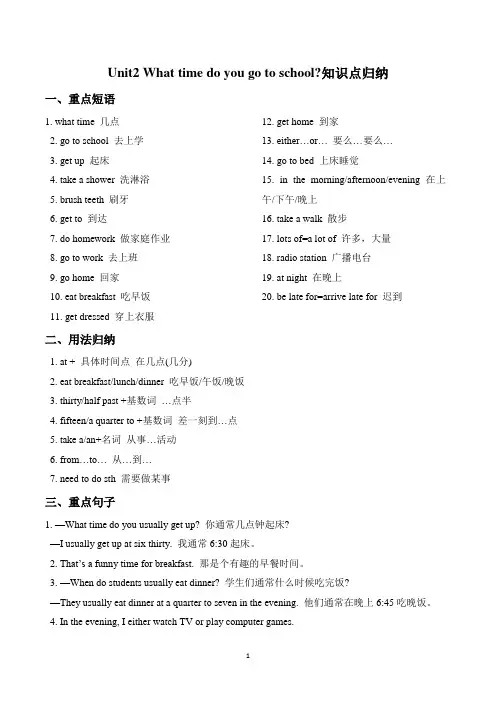
Unit2 What time do you go to school?知识点归纳一、重点短语1. what time 几点2. go to school 去上学3. get up 起床4. take a shower 洗淋浴5. brush teeth 刷牙6. get to 到达7. do homework 做家庭作业8. go to work 去上班9. go home 回家10. eat breakfast 吃早饭11. get dressed 穿上衣服12. get home 到家13. either…or… 要么…要么…14. go to bed 上床睡觉15. in the morning/afternoon/evening 在上午/下午/晚上16. take a walk 散步17. lots of=a lot of 许多,大量18. radio station 广播电台19. at night 在晚上20. be late for=arrive late for 迟到二、用法归纳1. at + 具体时间点在几点(几分)2. eat breakfast/lunch/dinner 吃早饭/午饭/晚饭3. thirty/half past +基数词…点半4. fifteen/a quarter to +基数词差一刻到…点5. take a/an+名词从事…活动6. from…to… 从…到…7. need to do sth 需要做某事三、重点句子1. —What time do you usually get up? 你通常几点钟起床?—I usually get up at six thirty. 我通常6:30起床。
2. That’s a funny time for breakfast. 那是个有趣的早餐时间。
3. —When do students usually eat dinner? 学生们通常什么时候吃完饭?—They usually eat dinner at a quarter to seven in the evening. 他们通常在晚上6:45吃晚饭。
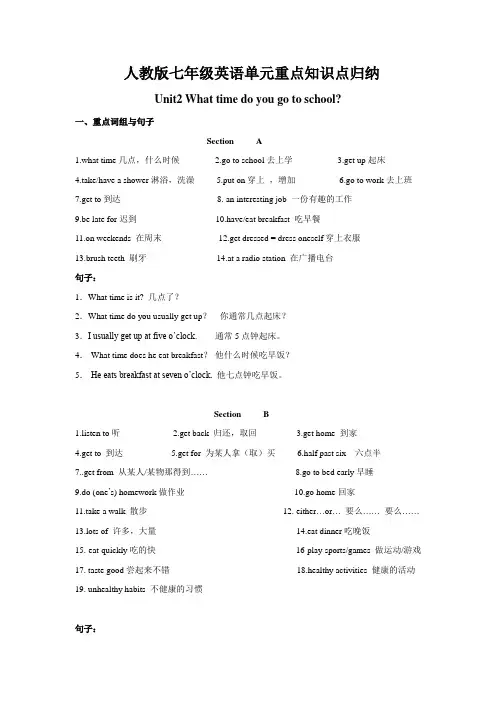
人教版七年级英语单元重点知识点归纳Unit2 What time do you go to school?一、重点词组与句子Section A1.what time几点,什么时候2.go to school去上学3.get up起床4.take/have a shower淋浴,洗澡5.put on穿上,增加6.go to work去上班7.get to到达8. an interesting job 一份有趣的工作9.be late for迟到10.have/eat breakfast 吃早餐11.on weekends 在周末12.get dressed = dress oneself穿上衣服13.brush teeth 刷牙14.at a radio station 在广播电台句子:1.What time is it? 几点了?2.What time do you usually get up?你通常几点起床?3.I usually get up at five o’clock. 通常5点钟起床。
4.-What time does he eat breakfast?他什么时候吃早饭?5.-He eats breakfast at seven o’clock. 他七点钟吃早饭。
Section B1.listen to听2.get back 归还,取回3.get home 到家4.get to 到达5.get for 为某人拿(取)买6.half past six 六点半7..get from 从某人/某物那得到……8.go to bed early早睡9.do (one’s) homework做作业10.go home回家11.take a walk 散步12. either…or…要么……要么……13.lots of 许多,大量14.eat dinner吃晚饭15. eat quickly吃的快16 play sports/games 做运动/游戏17. taste good尝起来不错18.healthy activities 健康的活动19. unhealthy habits 不健康的习惯句子:1.When do students usually eat dinner?学生们通常什么时候吃晚餐?2.I don’t have much time for breakfast.我没有许多时间吃早餐。
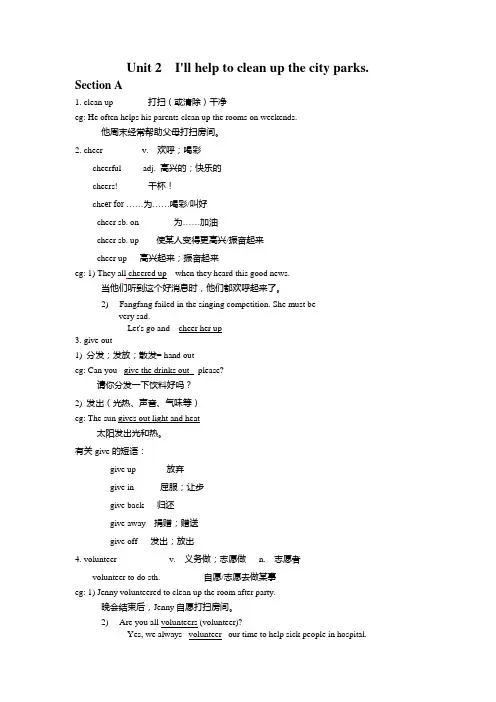
Unit 2 I'll help to clean up the city parks. Section A1. clean up 打扫(或清除)干净eg: He often helps his parents clean up the rooms on weekends.他周末经常帮助父母打扫房间。
2. cheer v. 欢呼;喝彩cheerful adj. 高兴的;快乐的cheers! 干杯!che er for ……为……喝彩/叫好cheer sb. on 为……加油cheer sb. up 使某人变得更高兴/振奋起来cheer up 高兴起来;振奋起来eg: 1) They all cheered up when they heard this good news.当他们听到这个好消息时,他们都欢呼起来了。
2) ---Fangfang failed in the singing competition. She must bevery sad.---Let's go and cheer her up3. give out1) 分发;发放;散发= hand outeg: Can you _give the drinks out please?请你分发一下饮料好吗?2) 发出(光热、声音、气味等)eg: The sun gives out light and heat太阳发出光和热。
有关give的短语:give up 放弃give in 屈服;让步give back 归还give away 捐赠;赠送give off 发出;放出4. volunteer v. 义务做;志愿做n. 志愿者volunteer to do sth. 自愿/志愿去做某事eg: 1) Jenny volunteered to clean up the room after party.晚会结束后,Jenny自愿打扫房间。
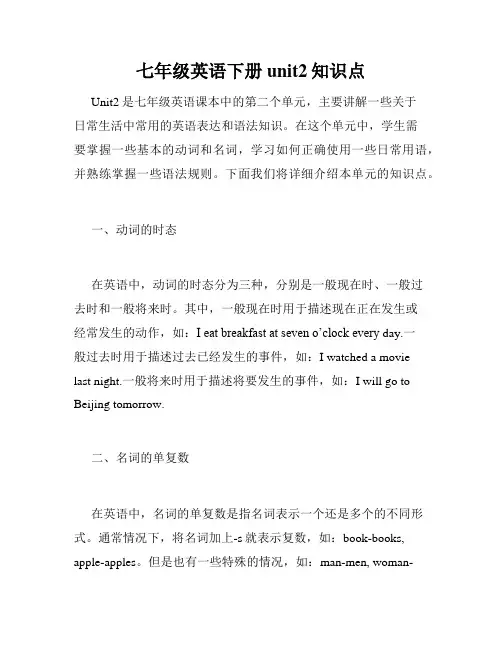
七年级英语下册unit2知识点Unit2是七年级英语课本中的第二个单元,主要讲解一些关于日常生活中常用的英语表达和语法知识。
在这个单元中,学生需要掌握一些基本的动词和名词,学习如何正确使用一些日常用语,并熟练掌握一些语法规则。
下面我们将详细介绍本单元的知识点。
一、动词的时态在英语中,动词的时态分为三种,分别是一般现在时、一般过去时和一般将来时。
其中,一般现在时用于描述现在正在发生或经常发生的动作,如:I eat breakfast at seven o’clock every day.一般过去时用于描述过去已经发生的事件,如:I watched a movielast night.一般将来时用于描述将要发生的事件,如:I will go to Beijing tomorrow.二、名词的单复数在英语中,名词的单复数是指名词表示一个还是多个的不同形式。
通常情况下,将名词加上-s就表示复数,如:book-books, apple-apples。
但是也有一些特殊的情况,如:man-men, woman-women等。
除此之外,还需要掌握一些不规则的名词变化形式,如:child-children, tooth-teeth等。
三、日常用语在日常生活中,使用一些简单而实用的英语表达可以让我们更好地进行交流。
下面是一些常用的表达:1.问候语:Hello! Hi! Good morning/afternoon/evening! How are you?2.道别语:Bye! See you later! Goodbye!3.询问时间:What time is it? It’s ten o’clock.4.询问日期:What’s the date today? It’s September 1st.5.请求帮助:Excuse me, can you help me?6.感谢和道歉:Thank you! Sorry!四、there be句型“There be”是英语中用来表示某地有某物,某人在某地等含义的一种句型。
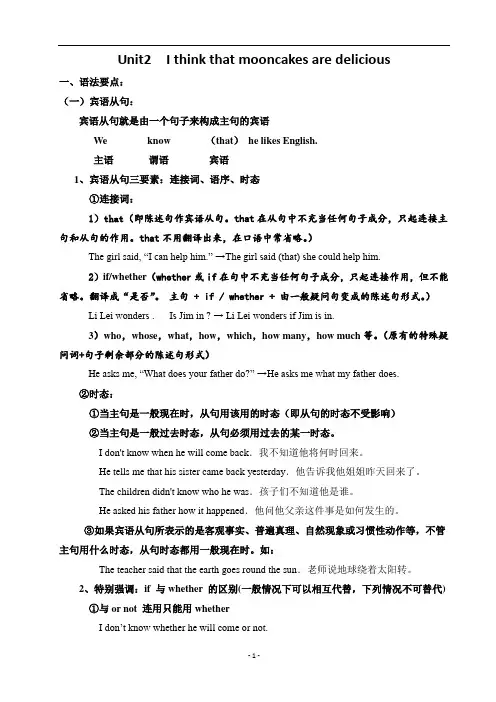
Unit2 I think that mooncakes are delicious一、语法要点:(一)宾语从句:宾语从句就是由一个句子来构成主句的宾语We know (that)he likes English.主语谓语宾语1、宾语从句三要素:连接词、语序、时态①连接词:1)that(即陈述句作宾语从句。
that在从句中不充当任何句子成分,只起连接主句和从句的作用。
that不用翻译出来,在口语中常省略。
)The girl said, “I can help him.”→The girl said (that) she could help him.2)if/whether(whether或if在句中不充当任何句子成分,只起连接作用,但不能省略。
翻译成“是否”。
主句 + if / whether + 由一般疑问句变成的陈述句形式。
)Li Lei wonders . Is Jim in ? → Li Lei wonders if Jim is in.3)who,whose,what,how,which,how many,how much等。
(原有的特殊疑问词+句子剩余部分的陈述句形式)He asks me, “What does your father do?”→He asks me what my father does.②时态:①当主句是一般现在时,从句用该用的时态(即从句的时态不受影响)②当主句是一般过去时态,从句必须用过去的某一时态。
I don't know when he will come back.我不知道他将何时回来。
He tells me that his sister came back yesterday.他告诉我他姐姐昨天回来了。
The children didn't know who he was.孩子们不知道他是谁。
He asked his father how it happened.他问他父亲这件事是如何发生的。
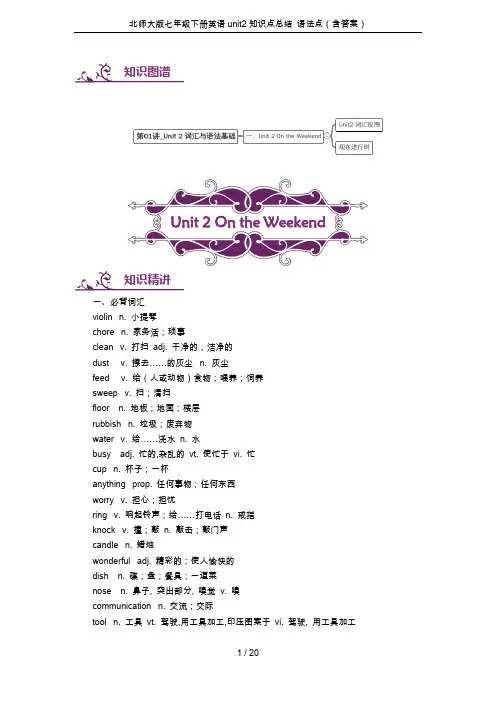
知识图谱Unit 2 On the Weekend知识精讲一、必背词汇violin n. 小提琴chore n. 家务活;琐事clean v. 打扫adj. 干净的,洁净的dust v. 擦去……的灰尘 n. 灰尘feed v. 给(人或动物)食物;喂养;饲养sweep v. 扫;清扫floor n. 地板;地面;楼层rubbish n. 垃圾;废弃物water v. 给……浇水n. 水busy adj. 忙的,杂乱的vt. 使忙于vi. 忙cup n. 杯子;一杯anything prop. 任何事物;任何东西worry v. 担心;担忧ring v. 响起铃声;给……打电话n. 戒指knock v. 撞;敲n. 敲击;敲门声candle n. 蜡烛wonderful adj. 精彩的;使人愉快的dish n. 碟;盘;餐具;一道菜nose n. 鼻子, 突出部分, 嗅觉v. 嗅communication n. 交流;交际tool n. 工具vt. 驾驶,用工具加工,印压图案于vi. 驾驶, 用工具加工instant adj. 立即的message n. 信息,消息text n. 文本;文章v. 发短信send v. 发送receive v. 接到;收到while n. 一会儿conj. 在……期间slow adj. 慢的adv. 慢慢地vt.& vi. 放慢,减速just adv. 只是;正好;刚才website n. 网站bank n. 银行;河岸museum n. 博物馆police n. 警察部门;警方station n. 站,所,局;火车站;电视台post n. 邮政;职位v. 邮寄;张贴;发布office n. 办公室,职务,事务train n. 火车underground n. 地铁way n. 路线;路;方法excuse v. 原谅n. 借口;理由cross v. 穿越,越过,横过street n. 大街;街道road n. 路,道路,公路corner n. 角;街角miss v. 错过;想念opposite prep. 与……相对adj. 对面的;across prep. 从一边到另一边;横过square n. 广场gym n. 体育馆;健身房二、重点词汇1. busy adjective /ˈbɪzi/If you are busy, you are working hard, or giving your attention to a particular thing.忙碌的;忙于……的;专注的1). Mum was busy in the kitchen.妈妈在厨房里忙活呢。
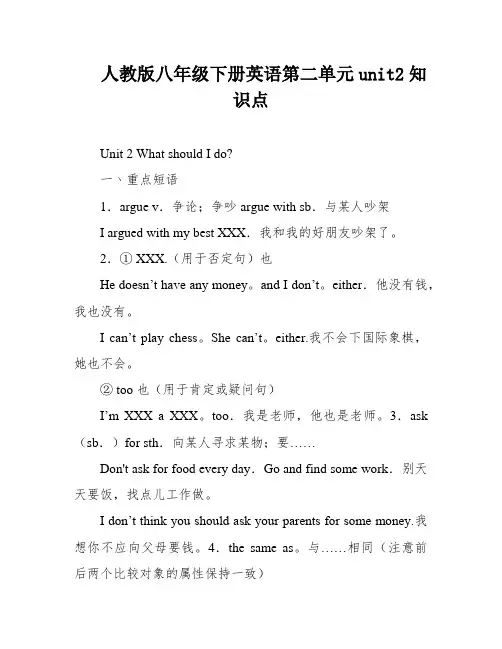
人教版八年级下册英语第二单元unit2知识点Unit 2 What should I do?一丶重点短语1.argue v.争论;争吵argue with sb.与某人吵架I argued with my best XXX.我和我的好朋友吵架了。
2.① XXX.(用于否定句)也He doesn’t have any money。
and I don’t。
either.他没有钱,我也没有。
I can’t play chess。
She can’t。
either.我不会下国际象棋,她也不会。
② too 也(用于肯定或疑问句)I’m XXX a XXX。
too.我是老师,他也是老师。
3.ask (sb.)for sth.向某人寻求某物;要……Don't ask for food every day.Go and find some work.别天天要饭,找点儿工作做。
I don’t think you should ask your parents for some money.我想你不应向父母要钱。
4.the same as。
与……相同(注意前后两个比较对象的属性保持一致)XXX same asmy friends'.这些衣服与我朋友的一样。
Tom is the same age as Anna.=Tom is as old as Anna.汤姆和XXX一样大。
Her backpack is the same as XXX.她的背包与我的一样。
5.except除……之外;(不包孕……在内)My class has been XXX.除我之外,我的同砚都被约请了。
All the students went to the park except him.除他之外,部分同砚都去过公园了。
XXX.除了她以外,所有的学生都去美国旅行过。
注意区别:besides除……以外,还有。
(包括在内)We all went there besides him.除他去以外,我们也都去了。
Unit 2 Wildlife Protection(教材P14)Our planet's is dying out at an alarming rate.我们星球的……正在以惊人的速度消亡。
(1)die out灭绝;逐渐消失;逐渐熄灭die away逐渐减弱,逐渐模糊,逐渐消失die down 逐渐降低,逐渐平息die off 相继死去die of 死于(内因)die from 死于(外因)①The sound of the engine died away as the car drove into the distance.随着汽车向远方开去,发动机声渐渐消失。
②After the talk the man's anger died down a bit.谈话之后,这名男子的愤怒平息了一点。
③With society developing,many old customs are dying out.随着社会的发展,许多古老的风俗在逐渐消失。
(2)alarming adj.惊人的;使人惊恐的1)alarm vt.使惊恐;使害怕;使担心n. 警报;恐慌in alarm 惊恐地give the alarm to... 给……发警报2)alarmed adj. 惊恐的;忧虑的be alarmed at/by... 对……大为惊慌be alarmed to do... 做……感到恐慌④The little girl was alarmed at the snake.这个小女孩被蛇吓了一跳。
⑤The boy was alarmed to see (see) the bear walking to him.这个男孩看到熊走向他,很是惊慌。
⑥We were alarmed (alarm) at the alarming (alarm) scream as the scream did alarm us.我们被那令人惊恐的尖叫声吓了一跳,因为那叫声的确使我们感到惊恐。
人教版九年级英语Unit 2 知识点总结Unit 2 I think that mooncakes are delicious!一.短语归纳1.put on 增加(体重)发胖2.care about 关心在乎3.end up 最终成为,最后处于4.not only ……but also……不但……而且……5.shoot down 射下ed to do 过去常常做……7.remind sb. of 使某人想起8.give out 分发发放9.the water festival 泼水节10.the Chinese spring festival 中国春节11.next year 明年12.sound like 听起来像13.each other 互相彼此14.in the shape of 以……的形状15.on mid-autumn night 在中秋之夜16.fly up to 飞向y out 摆开布置e back 回来19.as a result 结果因此20.mother’s day 母亲节21.more and more popular 越来越受欢迎22.think of 想起认为思考23.dress up 装扮穿上盛装24.the importance of ……的重要性25.make money 挣钱26.in need 需要帮助处于困境中27.between ……and……在……和……之间28.the dragon boat festival 龙舟节29.the lantern festival 元宵节30.like best 最喜欢31.go to ……for a vacation 去……度假32.be similar to 与……相似33.wash away 冲走洗掉34.mid-autumn festival 中秋节35.shoot down 射下36.call out 大声呼喊37.the tradition of ……的传统38.at night 在夜里在晚上39.one……,the other……一个……,另一个…40.Father’s day 父亲节41.have to 必须不得不42.play a trick on sb 捉弄某人43.the spirit of ……的精神44.care about 关心45.wake up 醒来46.the beginning of ……的开始二.用法集萃1.感叹句式一:What+(a/an)+adj+名词(+主语+谓语+其他)!多么……的……感叹句式二:How +adj/adv+主语+谓语+其他!……多么……!2.in+时间段在……后3.give sb. sth. 给某人某物4.plan to do sth 计划做某事5.refuse to do sth 拒绝做某事6.one of +名词复数形式……之一7.it +is+名词+动词不定式(to do sth)做某事是…8.what …think of…?认为…怎么样?9.make sb do sth 让某人做某事ed to be 过去是……11.warn sb(not)to do sth告诫某人做某事12.tell sb(not)to do sth 告诉某人做某事13.decide to do sth 决定做某事14.promise to do sth 承诺、答应做某事三.语法全解1.宾语从句一.连词a.陈述语序(that)b.一般疑问句(if 或whether)c.特殊疑问句(5w,1h)二.陈述语序三.时态可跟that从句做宾语的动词:say, think, insist, wish, hope, demand, imagine, wonder, know, see, believe, agree, admit, deny, expect, explain, order, command, feel, dream, suggest, hear, mean, notice, prefer, request, require, propose, declare, report等例:I don’t know what they are looking for.Could you tell me when the train will leave?注意:当主句谓语动词是think, believe, suppose, expect 等词,而宾语从句的意思是否定时,常把否定转移至主句表示。
八年级英语下册Unit 2单元知识点一、重点短语1. go to sp for a/one’s holiday去某地度假2. be on holiday在度假3. have been to sp去过某地(已经回来)4. have gone to sp去了某地(还没回来)5.join sb in doing sth加入某人去做某事6. get ready for sth. 为……做好准备get ready to do sth.准备做某事7.take sth. with sb.随身携带8. place of interest 名胜9. see each other 互相见面10. miss sb. very much 非常想念某人11.have a fantastic/good/nice/wonderful time=have fun=enjoy oneself玩得愉快12. get to sp.=reach sp.=arrive at/in sp. 到达某地(没有目的地只用arrive)13.at the speed of … 以……的速度14. through the ride在行程中15.(动词)hurry to sp/ go to sp in a hurry(名词) 16. such as/for example例如17. later in the afternoon=in the late afternoon下午迟些时候18. the best part of the day 这天最好部分19. run after sb.追赶某人20. can’t stop doing =can’t help doing 禁不住做某事21. Stop to do something停下来去做另一件事Stop doing something停止正在做的……22. be like magic像魔法一样23. a couple of = a pair of 一双;一对24. near/at the end of 将近/在…结束的时候25. in the end=finally 最后26. by the end of到..为止27. during your stay there (名词) 在你待在那期间28.let me have a look at sth.让我看一下某物29.go to sp to attend a meeting去某地开会30.在沙滩上玩play on the sand 31. 顺便说一下by the way 32. 邀请某人去野餐invite sb to go for a picnic33.去野餐go for a picnic /have a picnic 34.中国园林Chinese gardens35.自然景观places of natural beauty36.全年去那儿go there all year round(during the whole year)37.在任何季节in any season 38.在一年的那个时刻at that time of year39.去某地出差go to sp on business 40.leave for sp动身去某地,前往某地42.在一大早in the early morning43.坐飞机去某地take a plane to sp / take a flight to spgo to sp by air / plane go to sp on a plane44.wave to sb.向某人挥手二、词汇梳理1.miss sb. very much 非常想念某人miss v.1)思念;想念When I studied in USA,I miss my parents very much.2)错过,没赶上Hurry up, or you will miss the bus.n. 小姐,后接姓氏时,常常大写This is my English teacher, Miss li.2.spend the whole day at Disneyland在迪斯尼度过一整天spend v 1)度过I spent my winter holiday in Hainan.2) 花费spend + 时间/金钱on + 东西spend + 时间/金钱(in) doing somethingE.g. I spent an hour on my homework yesterday.I spent an hour in doing my homework yesterday.3.On the way 在路上on the way to + 地点在去……的路上on one’s way t o + 地点在某人去……的路上注意:遇到home/here/there 等地点副词时省略to4. see sb. playing on the sand看到某人正在沙滩上玩see somebody doing sth看到某人正在做see somebody do sth看到某人做某事的过程或经常看到某人做某事E.g.I saw him working in the garden yesterday. Jim often sees Mary help others.5.die v 死亡His grandfather died last week.death n 死亡He cried after knowing his grandfather’s death.dying 动词现在分词;形容词奄奄一息的,垂死的His grandfather is dying. 他的爷爷快过世了。
译林八年级下册Unit2 Travelling全文分模块详解(后有练习解答)Comic strip&Welcome to the unit【课时导航】一、重难点分析。
1. I don’t think it’ll be a holiday for me. 我想对我而言这不会是什么假期了。
这是否定前移的句子,主句中的否定词实际否定的是从句的内容。
当主句含有I think/I believe等词语时,常用否定前移。
I think she is right. (否定句) _______________________.2. It comes from the story by Hans Christian Andersen. 它来自安徒生写的故事。
the story by sb意为“某人写的故事”。
e.g. I want to borrow _____________________ Lu Xun.我想借一本鲁迅写的书。
二、翻译下列短语。
1.去南山________________________________2.已经去过那儿__________________________3.做准备________________________________4.如此兴奋______________________________5.带上这个包____________________________6.一些名胜______________________________7.丹麦的首都____________________________8.来源于故事____________________________9.长城__________________________________10.加入他们当中_________________________【实战演练】一、根据首字母、汉语意思填写单词。
1. Washington D.C. is the c____________ of the USA.2. The boy is getting r__________ for his exam now.3. The story comes from the book b__________ Moyan, a famous writer.4. If you go to London, you can visit the famous T_________ Bridge.5. Going on a trip in the forest must be very ___________ (有趣的).6. I’m so ____________ (兴奋的) to have a picnic with my best friend.7. Have you been to Hainan for a ____________ (假日)?8. Places of interest each have __________ (特别的) signs.二、用所给词的适当形式填空。
新高中英语选择性必修一Unit2 单元知识点归纳一、短语、词块归纳1.switch on/off开、关2.remote control 遥控3.daily routine 日常生活4.early on 在初期;早先5.catch fire 着火6.in this/a sense 从这种/某种意义上来说7.artificial intelligence 人工智能8.keep in touch(with...) 与...保持联系9.all the time 始终,一直10.have a preference for偏爱... ;更喜欢11.the instant(=as soon as) 一......就.....12.in addition 此外;另外13.keep track of 记录;与...保持联系14.provide sb. With sth.(=provide sth. For sb.) 提供某人某物15.monitor your health监测你的健康状况16.respond to 回应;响应17.be available to/for sb. 对某人来说可获得的18.no longer 不再e on 快点儿;开始工作20.persuade sb. To do sth. (=persuade sb. Into doing sth.) 说服某人做某事21.in the distance 在远处22.be relevant to与...有关e true (梦想) 实现bine...with... 把...和...结合起来25.Benefit from/by 从...中受益;受益于...26.Can not help but do sth. 不得不;只好;忍不住做...27.send out 发出(光、信号、声音等);分发;散发28.hang out 闲逛,常去某处29.a variety of 各种各样的;多方面的30.advances in technology 技术进步31.apologise for...(make an apology for)为...道歉32.on the one hand... on the other hand 一方面...另一方面..33.in the absence of缺乏,不存在;无...时;缺少...时34.put/lay/place emphasis on sth. 强调/重视某事35.follow the lives of 追随...的生活36.It could even be argued that... 甚至可以说...37.rather than而不是;宁可...也不愿38.even if即使;即便;尽管39.allow sb. To do sth.允许某人做某事40.care about 关心;在乎41.look on 旁观;看待42.resist doing sth. 抵制/反对做某事43.get into the best shape of 进入最佳状态44.look on the positive sides of看待事物积极的一面二、重点句式1.Your lights will come on the instant you enter the door along with your favourite music or TV programmes, and you will find your dinner already prepared for you.你一踏进家门,伴随着你最喜欢的音乐或电视节目,你的灯就会亮起来。
Book 1 Unit 2 Let's talk teens一、词性转换1. argument n.争吵,争论;论点→argue vi.争吵,争辩,争论vt.说理,论证2. anxious adj.忧虑的,担心的;令人焦虑的;渴望的→anxious ly adv.不安地,忧虑地→anxiety n.担忧,焦虑3. anger n.怒气,怒火→angry adj.生气的,怒的→angrily adv.4. mental adj.思想的,精神的,智力的→mentally adv.精神上;智力上→physical adj. 物质的,身体的5. desire n. & vt.渴望,愿望→desirable adj.可取的,向往的6. regular adj.频繁的;有规律的→regularly adv.定期地,有规律地→irregular adj.不规则的,非正规的7. calm vt.使平静,使镇静adj.镇静的,沉着的→calmly adv.冷静地→calmness n.冷静,平静8. view n.看法;视线;景色vt.把……视为;观看→viewer n.观众,电视观众,观察者9. concern n.担心,忧虑;关心vt.涉及;让(某人)担忧→concerned adj.有关的,关心的→concerning prep.关于,涉及10. normal adj.正常的,一般的n.常态,通常标准→normally adv.正常地→(opp.)abnormal adj.反常的,不正常的11. stress n.精神压力,紧张;强调vt.强调,着重→stressful adj.压力大的,紧张的12. editor n.主编,编辑;剪辑师→edit v.编辑,编纂13. design vt.设计;制订n.设计;设计艺术→designer n.设计师,设计者,构思者14. likely adj.可能的,预料的,有希望的→unlikely adj.不可能的15. unique独一无二的;独特的;独具的,特有的→uniqueness n.独特,独一无二→uniquely adv.独一无二地,独特地,唯一地16. passive adj.消极的,被动的→passively adv.17. performance n.表现;表演;执行,履行→perform v.表演,履行;行动,执行,演奏→performer n.表演者,执行者18. press vt. & vi.催促,逼迫;按,压;挤,推n.报章杂志,报刊;(the press)新闻工作者,新闻界→pressure n.压力,压迫,(物理)压强19. eager adj.热切的,渴望的,→eagerness n.渴望,热心→eagerly adv.急切地,渴望地20. youth adj.青年时期;青春;( the youth )年轻人→young adj. 年轻的,没有经验的21. adventure n.冒险,冒险经历,奇遇→adventurous adj.爱冒险的;充满危险的→adventurer n.冒险家22. flexible adj.灵活的,可变动的;柔韧的→flexibly adv. 灵活地, 可变动地→flexibility n.灵活性,弹性→inflexible adj.顽固的,不灵活,死板的,僵化的23. account n.账户;描述;解释vt.认为是,视为→accountant n.会计师,会计人员24. secure adj.安心的;可靠的;牢固的→security n.安全性,保证,证券adj.安全的,保密的25. graduate vi. & vt.毕业n.毕业生→graduation n.毕业,毕业典礼26. gather vi.聚集,召集vt.收拢;搜集,收集;聚集→gathering n.聚会,集会27. emergency n.突发事件,紧急情况→emergent adj.突发的,紧急的28. volunteer vi. & vt.自愿做,义务做n.志愿者→voluntary adj.自愿的,主动的→voluntarily adv.志愿地29. operation n.手术;运转,操作→operate v.做手术,经营,起作用→operator n.接线员,操控者,操作者30. response n.回复;反应,响应→respond v.回答,回应,作出反应二、教材重点短语1. melt away融化,消灭2. go through经历;经受(尤指苦难或艰难时期),检查,翻找,(法律、合同等正式)通过3. physical and mental changes 身心变化4. deal with解决,处理,应付;论及,涉及(相关词汇:do with)5. turn into变成6. see eye to eye with sb.(on sth.)(在某事上)与某人看法一致7. result in导致8. at a different rate 以不同的速度9. shoot up快速长高,蹿个儿10. be left far behind 被远远地抛在后面11. have a desire for independence 渴望独立12. make decisions on your own 独自做决定13. on <the>one hand一方面, on the other hand另一方面14. struggle to do 努力做…15. a rough ride 艰难的旅程16. lead to a breakdown in relationship 导致关系破裂17. get along 相处18. take action/steps/measures to do sth.采取行动做某事19.disagree with sb.不同意某人20. calm down平静,镇静,安静21. from one’ s point of view从某人的角度、观点出发22. think sth. through充分考虑,全盘考虑,想透23. address one’ s concern 消除某人的疑虑24. back down承认错误,认输25. struggle with the stress 应对压力26. work together 合作27. turn out结果是28. in the end最后29. prepare you for adulthood 让你为成年做好准备30. ask for advice on … 寻求关于...的建议31. to tell the truth说实话,老实说32. argue with sb. (on/about/over sth.)与某人争辩(某事)33. show concern for … 对… 关心34. put stress on …给…施加压力35. refer to …指的是36. leave out 省略,遗漏37. be meant to …旨在做…,目的做…38. intend to do …打算做…39. draw one’s attention to … 使某人注意到40. take an interest in…对…感兴趣41. physical and mental health 身心健康42. look through 浏览43. be made up of …由…组成44. give out personal information 泄露个人信息45. reply to 回复,回答46. there’s no point in doing …做…没有意义47. take a passive role in the relation 在关系中处于被动地位48. push you to do better 逼迫你做得更好49. have a bad influence on your performance 对你的表现有不好的影响50. cheer up (使)变得高兴,振奋起来51. as if 好像52. leave sb. alone 不干涉,不打扰某人53. take a break once in a while 偶尔休息一下54. be eager for 渴望得到55. be stressed about 对…紧张56. feel lonely 感到孤单57. care about 关心58. be on sb.’s back about sth.缠磨,烦扰59. protect me from getting hurt 保护我免受伤害60. describe … as …把…描述为…61. a letter of advice 建议信62. follow the structure below 按照下面的结构63. be satisfied with … 对…感兴趣64. with anxious interest 带着焦虑的兴趣65. look up 抬头看;查找66. be proud of 对…感到骄傲67. secure feeling 安全的感觉68. graduate from 从…毕业69. be used for sudden emergencies 被用来应对紧急情况70. give up smoking 放弃抽烟71. reach across the table 从桌子对面伸过来72. d raw … out of …提取,支取73. be adapted from …由…改编74. perform with confidence 自信地表演75. body language 肢体语言76. adopt three orphans 收养三个孤儿77. take on the role of …扮演…的角色78. the determination to overcome all difficulties 克服所有困难的决心三、重要句型1. When it all gets too much,your parents are often the first targets of your anger.(P16)当这一切让你不堪重负时,父母常常会成为你发泄愤怒的首选目标。
Unit 2 I think that mooncakes are delicious! 知识点 一、重点短语: 1. the Lantern Festival 元宵节 2. the Dragon Boat Festival 端午节 3. the Water Festival 泼水节 4. be fun to watch 看着很有意思 5. eat five meals a day 一天吃五餐 6. put on five pounds 体重增加了五磅 7. in two weeks 两星期之后 8. be similar to... 与.......相似 9. throw water at each other 互相泼水 10. a time for doing sth. 做某事的时候 11. the traditional of… … 的传统 12. in the shape of... 呈……的形状 13. folk stories民间传说故事 14. go to…for a vacation 去…度假 15. wash away 冲走;洗掉 16. lay out摆开;布置 17. end up最终成为;最后处于 18. share sth. with sb. 与……分享…… 19. as a result结果 20. one,. . the other... (两者中的)一个…另一个… 21. take sb. out for dinner 带某人出去吃饭 22. dress up 乔装打扮 23. haunted house 鬼屋 24. trick or treat (万圣节用语)不给糖果就捣蛋 25. fly up to… 飞向… 26. take sb. around…带某人到处走走 27. play a trick on sb.捉弄某人 28. give out 分发 29. the importance of…. …..的重要性 30. care about….. 关心 31. call out 大声呼喊 32. remind sb. of 使某人想起 33. sound like 听起来像 34. treat sb. with. 用/以……对待某人 35. the beginning of new life 新生命的开始 36. the spirit of.. . ….的精神 37.on October the 31st 在10月31日 38.how touching 多么动人 39.have good luck in the new year在新的一年里有好运气 40. in need 需要帮助;处于困境中 41. not only…but also…不但…而且… 42. between…and… 在…和…之间
用法 1. What + a(n) + 形容词 + 可数名词的单数形式(+主语+谓语+其他)! 多么…..的…..! 2. How + 形容词/副词(+主语+谓语+其他)! …..多么….! 3. be going to 将要/打算….. 4. in + 时间段 在…后 5. give sb. Sth. 给某人某物;把某物给某人 6. plan to do sth. 计划做某事 7. refuse to do sth. 拒绝做某事 8. one of + 名词复数形式 ….之一 9. It is + 名词 + 动词不定式 做某事是…. 10. What…think of….? …认为…怎么样? 11. make sb. do sth. 让某人做某事 12. used to be 过去是…. 13. warn sb. to do sth. 警告某人做某事 14. tell sb. to do sth. 告诉某人做某事 15. decide to do sth. 决定做某事 16. promise to do sth.承诺做某事
二、重点句子: 讲一讲1(section A) 1. 宾语从句: 宾语从句在复合句中作主句的宾语。三大考点:引导词、时态和语序。 语句格式:由连接词+ 主语+ 谓语 构成 ;宾语从句要用陈述句语序。 (1)由陈述句充当宾语从句时,这个宾语从句由that 引导,在口语中that 可以省去。 如:I hear that she’s going to give you a call. 我听说他要给你打电话。 He says (that) he is at home. 他说他在家里。 (2)由连接代词、连接副词(疑问词) who、whom、whose 、what、when、how、where等引导,表示特殊疑问意义。 如:Do you know what he wants to buy? 你知道他想要买什么吗? I don’t know whom you should depend on. 我不知道你该依靠谁. He didn’t tell me when we should meet again. 他没有告诉我什么时候我们能再见面. None of us knows where these new parts can be bought. 没有人知道这些的新的零件能在哪里买到. (3)由if , whether 引导 表示一般疑问意义(带有是否、已否、对否等) 如:I don’t know if / whether Wei Hua likes fish. 我不知道韦华是否喜欢鱼。 He asked if/ whether they needed any help. 他问他们是否需要帮助。 注意:if 和 whether 引导宾语从句时,一般情况下可以互换,但要注意以下情况: ① 宾语从句移到句首时,用whether不用if. 如:Whether it is true or not , I can’t say. 那件事是否是真的,我不能说。 ② 在介词后常用whether不用if。 如:It depends on whether you can do the work well. 那取决于你是否能做好这项工作。 ③ 与不定式连用时,只能用whether. 如:He can’t decide whether to accept or refuse. 他不能决定是否接受还是拒绝。 ④ 当与or not 连用时,if 或whether 均可,但or not 直接跟在连词后时,则只能用whether. 如:Let me know whether/if you can came or not. 告诉我你是否能来。 I don’t care whether or not he comes 我不关心他是否来。 2. 宾语从句的时态: (1)主句用一般现在时,从句可用任意时。 (2)主句用过去时,从句用过去某个时态(一般过去时、过去进行时、过去完成时)。 如:I said that it was time we were setting out. 我说是我们动身的时候了。 She said that they would visit their grandparents. 她说他们将拜访他们的祖父母。 She wanted to know if I had finished m homework. 她想要知道我是否已经完成了我的作业 (3)主句用过去时,从句是真理时,只用一般现在时。 如:He said that light travels faster than sound. 他说光比声音传播得快。 3. what 和 how 引导的感叹句: (1)what 引导的感叹句的中心词是名词。该名词前常有形容词修饰,句中的主语和谓语一般可省去。 句型结构为:What (+a/an)+形容词+名词(+主语+谓语)! 如:what a cold day (it is ) today ! 今天天气真冷啊! What delicious food (it is)! 多好吃的食物啊! 注意:若中心词(名词)为单数可数名词,要用定冠词a/an而不用the ;若为复数或不可数名词, 则不用定冠词。 (2)how 引导的感叹句中心词是形容词或副词。句型结构为: How +形容词/副词+主语+谓语! 或 how +形容词+a/an+单数可数名词+主语+谓语! 如:how cold it is today ! 今天天气真冷啊! How beautiful a girl she is ! 她是多么漂亮的一个女孩! How happy the children are! 孩子们多开心啊! (3)陈述句改为感叹句: 陈述句改为感叹句时,常用“一断二加三换位”的方法: ① “一断”即谓语动词后边断开,把句子分为两部分;如: She is |a beautiful girl .她是一位美丽的姑娘。 He works |hard. 他工作努力。 ② “二加”即如果第二部分的第一个词为形容词、副词,就加上how;如果是名词,就加what。 如:she is|(what) a beautiful He works|(how)hard. ③ “三换位”即把第一部分与第二部分互换位置。 What a beautiful girl she is ! How hard he works!
练一练1 1. He said _____ she would leave the message on the headmaster's desk. A. that B. where C. which D. what 2. I think the Lantern Festival is beautiful A. what B. where C. which D. that 3. I believe the Water Festival is the most fun. A. what B. that C. which D. where 4. Could you tell me ________ the nearest hospital is? A.what B.how C.whether D.where 5. I want to know _________ . A.whom is she looking after B.whom she is looking C.whom is she looking D.whom she is looking after 6. A: I'm waiting for the mail. Do you know ________ it will arrive? B: Usually it comes by 4:00. A. how B. where C. when D. what 7. Could you tell me ______the radio without any help? A.how did he mend B.what did he mend C.how he mended D.what he mended 8. I want to know________. A. what is his name B. what's his name C. that his name is D. what his name is 9. The small children don't know _________ . A.what is their stockings in B.what is in their stockings C.where is their stockings in D.what in their stockings 10. I don't know ______ he will come tomorrow._______ he comes,I'll tell you. A;Whether B.whether;Whether C.if;That Dif;If 11. I wonder ________ you would like to come to my birthday party. A. that B. whether C. that if D. that whether 12. The teacher told us yesterday that December 25 _____Christmas Day. A. is B. was C. has been D. which 13. Do you know where _________ now? A.he lives B.does he live C.he lived D.did he live 14. Do you know what time _________ ? A.the train leave B.does the train leave C.will the train leave D.the train leaves 15. Do you know if ________ back next week? If he ________ back, please let me know. A. he comes, will come B. will he come, comes C. he will come, comes D. will he come, will come 16. Tell me _________ you’d like to play football or not . A. if B. whether C. that D. when 17. He can finish the work in two hours. He says. (复合句) He says ___________ he can finish the work in two hours.